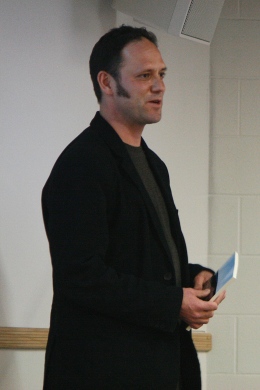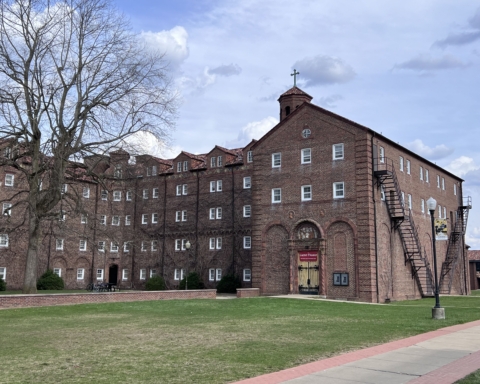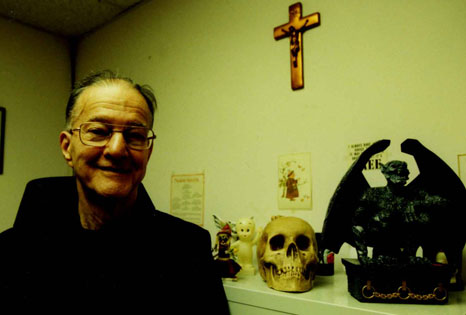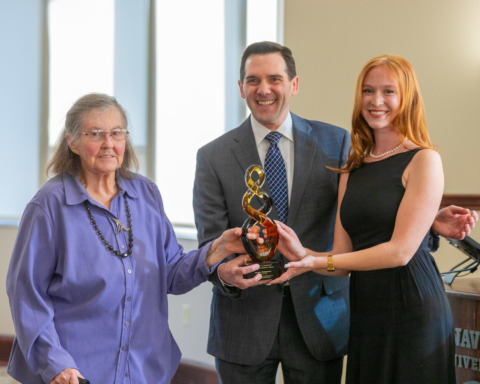By Matthew Laurrie
Assistant Features Editor
Life is like a work of literature. You never know what you’re going to uncover.
“Your poems are always smarter than you are,” Jonathan Skinner said.
Skinner, a poet, editor and ecocritic, dubbed the previous quote a line in the poem of his life. He said it was the main lesson he has learned since beginning his advantageous poetic exploits.
The School of Arts and Sciences, in conjunction with the English department, recently kicked off the 2012 Writers Series to give the campus community a chance to work its way into the minds of various writers. Skinner was the first author in the series with his presentation Tuesday in Walsh Amphitheater.
Patrick Panzarella, associate professor of English and chair of the English department, said the idea to begin the Writers Series arose after the dean of the School of Arts and Sciences, Wolfgang Natter, obtained grant funding for the program.
“A great deal of the credit for this goes to Dean Natter because he managed to get some funding for what he called ‘Good Ideas Grants,'” Panzarella said. “He invited different departments in arts and sciences to come up with ways to use some of this grant money to do things that might enhance the experience for their majors.”
Panzarella said the authors would not only be conducting presentations for a public audience, but would also be collaborating with English professors in order to enrich the classroom experience for students.
“Each one of them will be going into classrooms,” he said. “The focus here is on enhancing the experience for English majors this semester. It’s also kind of exciting and enlivening to have somebody come in who really has some acclaim and expertise.”
Kaplan Harris, associate professor of English, was the force behind bringing Skinner to campus. Harris explained he has enjoyed Skinner’s work for a while.
“I’ve just been a big fan of his books, his publishing, his editing for a long time,” Harris said. “He’s a pretty prolific writer.”
Skinner is the editor of ecopoetics, a journal “dedicated to exploring creative-critical edges between writing and ecology,” according to the journals website.
In addition, Skinner has penned poetic compilations, including “Birds of Tifft” and “Political Cactus Poems.”
Skinner shared an analogy he once heard to define the distinction between nature poems and ecopoetics, which encompasses how his poetic genre connects environmental ecology with environmental politics.
“The nature poem is about the bird and the nest,” he said. “The ecopoem is about the bird and the nest and the bulldozer that’s about to sweep away the bird’s nest.”
Harris said Skinner’s journal is a unique compilation of various literary categories, including poetry, essays and reviews. Readers are able to learn from what they read and how the literature is written.
“It’s a combination of different genres,” Harris said. “That’s part of what poetics is about – it’s about combining poetry with prose and blurring the distance between the two of them.”
During the presentation, Skinner recited a number of his poems and utilized a multimedia format to substantiate and enhance some of his works.
Lauren Caputi, a junior English and journalism and mass communication major, said combining digital media with the readings gave her a better appreciation for Skinner’s works.
“The integration of the media was really cool,” Caputi said. “It added a certain extra element to (the presentation) to keep the listener interested. It was neat, and overall I’m really glad I came.”
Kevin Cooley, a sophomore English major, is enthusiastic about the lecture series this semester, and he said he thoroughly enjoyed Skinner’s hour-long presentation.
“I think it was absolutely awesome to have a speaker here for the English department,” he said. “The presentation itself was great. It was on a really interesting topic and it was just very diverse, well-written poetry.”
Rachel Speciale, a freshman English major, noted Skinner’s poems helped her appreciate nature more, and the way he read his works aided her comprehension of a topic typically foreign to her.
Skinner said the opportunity to speak on campus and interact with students is mutually beneficial for him and the school community.
“I think for outside visitors to come in and bring a different perspective can be always refreshing for the students, for the faculty,” Skinner said. “Also, I get to see another institution and how the discourse runs and (the) people who are there.”
The 2012 Writers Series will welcome a number of acclaimed authors to campus throughout the semester. Peter Makuck (April 11), poet, short-story writer and critic; Gregory Betts (April 19), poet, editor, essayist and teacher; Devin Murphy (date to be determined), writer and 2002 Bonaventure graduate; and a slam poet (date to be determined) will all be speaking on campus this spring.
Harris explained poetry can take many forms, and people should explore this literary outlet. He also said he hopes the St. Bonaventure community will engage in the lectures on campus.
“Poetry is not just an artistic practice; it’s a social practice as well,” he said. “I strongly advocate going to readings so that you can see poetry performed. Poems don’t exist just in a book or in a magazine – they exist socially in the kind of interaction that can happen in a reading series.”
laurriemr11@bonaventure.edu






